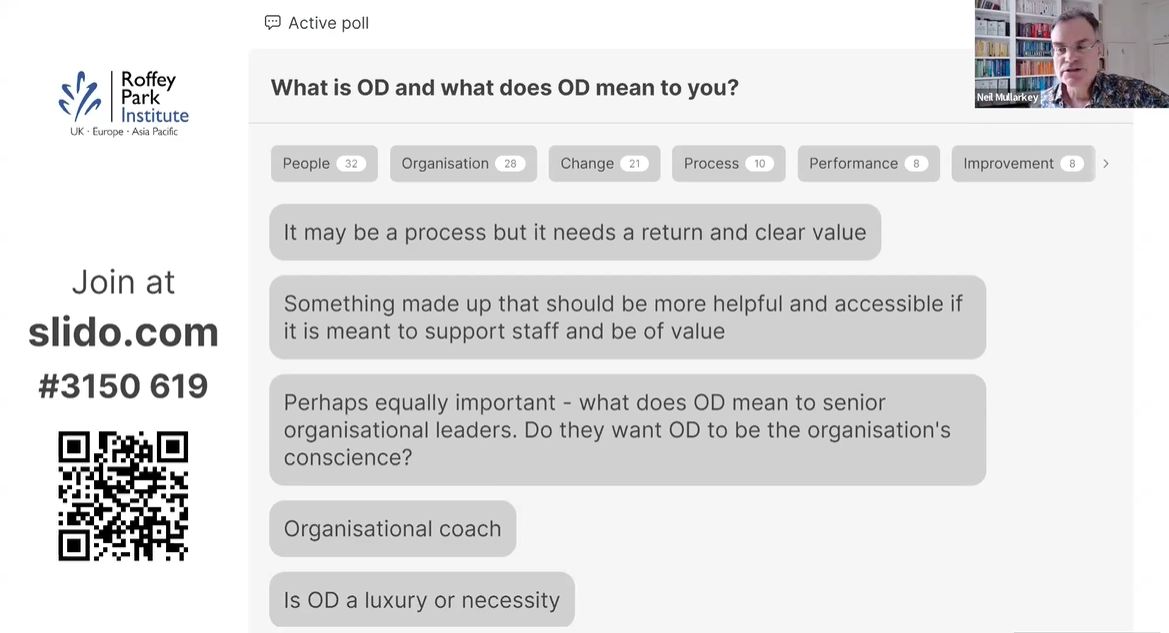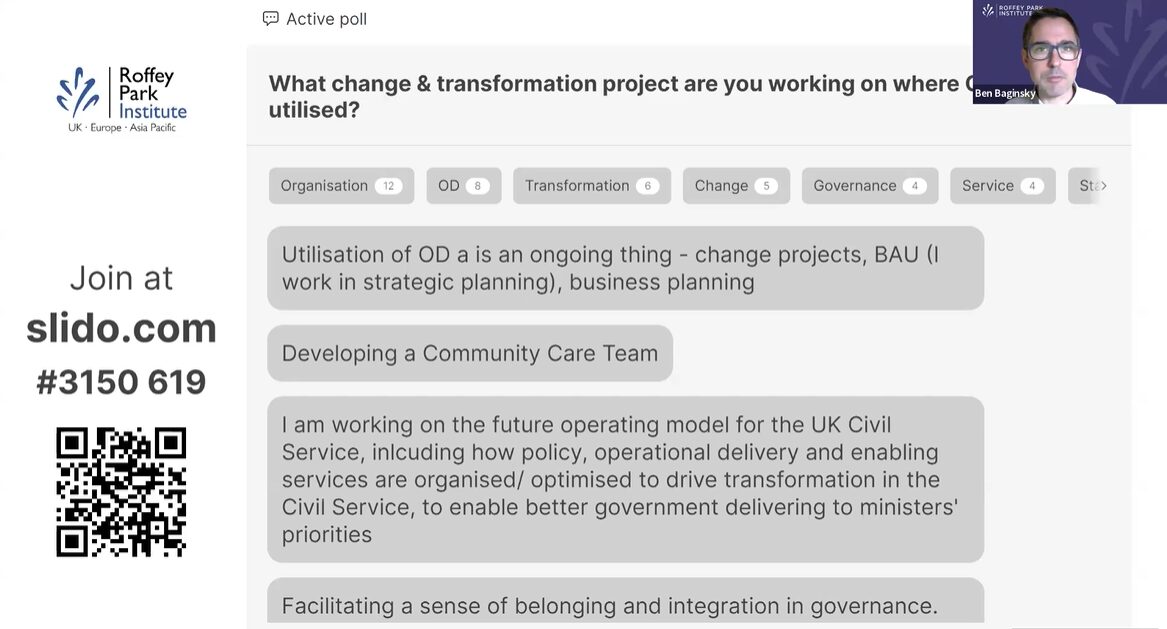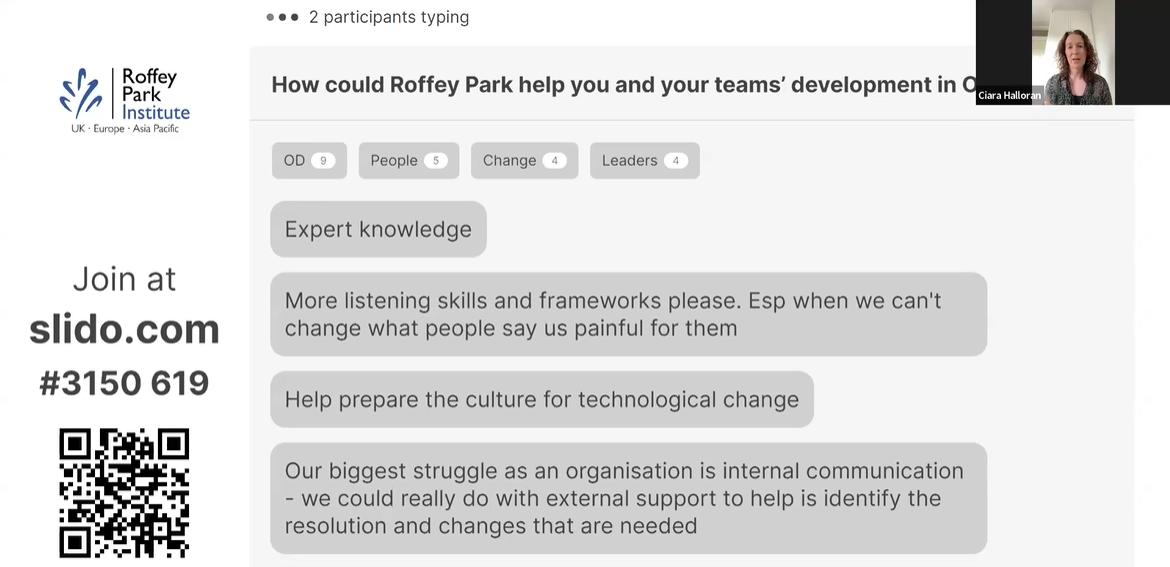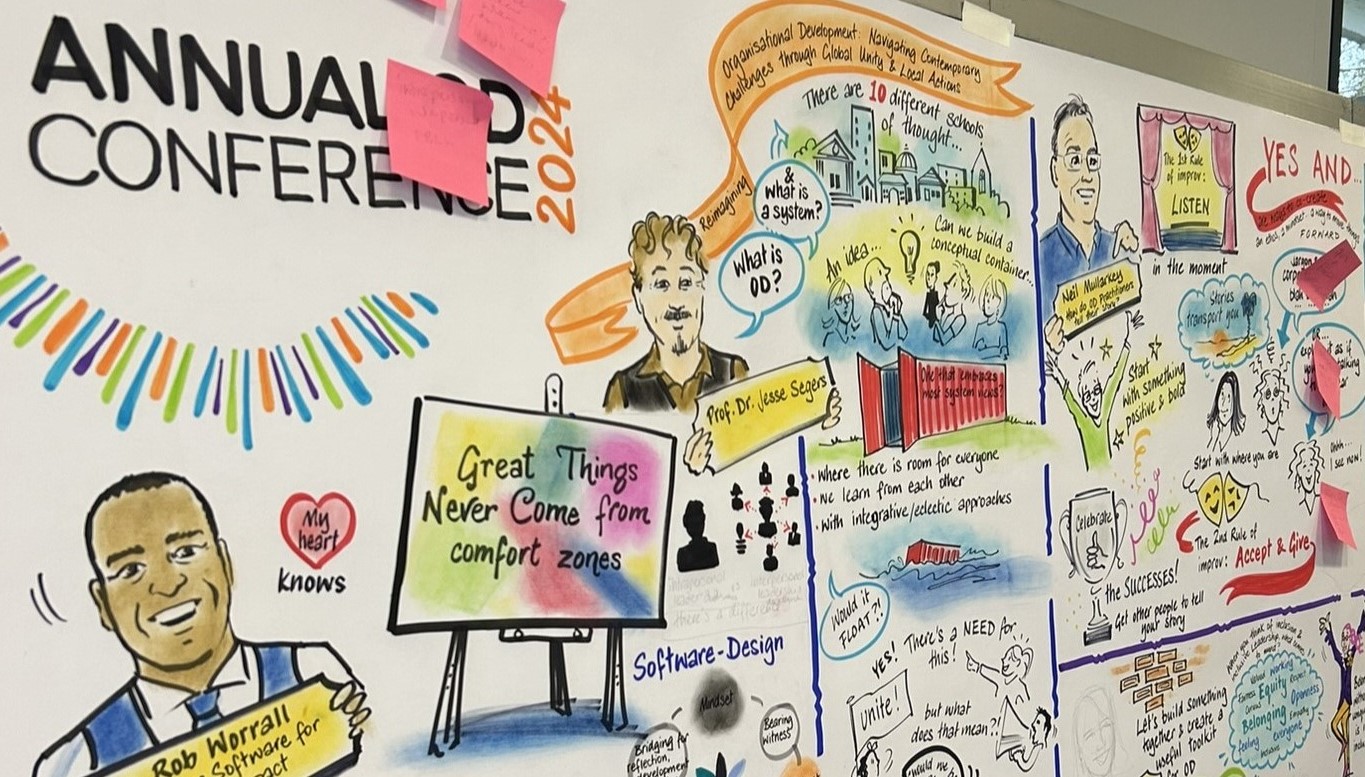On Tuesday morning’s navigator event, Driving Change and Transformation The Power of Organisational Development (OD), an esteemed panel of professionals who operate within the space of OD discussed, using their own experiences and contexts, what OD is and means to them, how OD can be utilised effectively to drive change and transformation and how Roffey Park Institute can help with people and team development in OD.
Hosted by the ever-so energetic, welcoming and inquisitive improvisation and communication expert, Neil Mallarky, the event begun with greetings from participants from all over the world. Participants used the chat function to say where they were joining from, being a virtual event, and what industry they work in, as well as answering Neil’s lighter-hearted introductory question – are you wearing socks or slippers? One attendee commented that her dog was lying on her feet to keep them warm. With most of the guests based in the United Kingdom, other represented nations included Ireland, Romania, Germany, France, Austria and Botswana, as well as Hong Kong.
After this, Roffey Park Institute (RPI) CEO, Dr Arlene Egan, kick-started the navigator event by introducing the expert panel: Helen Ashley, the Director of OD at the University of Manchester; Matt Winter, a Culture and Social Impact Consultant; Ciara Halloran, Head of Operations (EUR) for RPI; Jan Moorhouse, Head of Research, Thought Leadership and Academic Delivery at RPI and Ben Baginsky, Programme Director at RPI.
What is OD and what does OD mean to you?
Neil then proceeded with the first discussion topic. Participants were asked, ‘What is OD and what does OD mean to you?’ Through an audience interaction tool, Slido, audience members’ answers appeared for all to see. Whilst answers began to trickle in, the panel was asked for their thoughts. Helen Ashley began, “For me, the key thing about OD is about how people lead organisational performance. It is an outcome based upon the inputs of all the colleagues within an organisation – the prize is sustained high performance.”
Matt Winter, who graduated from the RPI MSc in People and OD in 2023, offered a different perspective only being in the OD space for a shorter period of time. “I am still learning to articulate what I understand OD to be”, a theme shared by some of the audience members. “For me, OD is all about organisational effectiveness. OD is a journey; to do it effectively we need to know what risks and challenges are involved, but it has the power to make organisations effective.” He added.

By the time all the answers from the participants were in, three words stood out as the most popular – ‘people’, ‘organisation’ and ‘change’, with the next most popular word, ‘performance’, some distance behind. Interestingly, Ciara Halloran’s definition of OD reflected this. She said, “I agree with Matt, OD has always been about organisational effectiveness, but what has changed for me is that OD is now really looking at change through people and people being the key enablers of successful change.”
Jan Moorhouse noticed that ‘dynamic’ was a word used often by audience members. She added, “OD is also about the process – it is not a thing, nor a tick box exercise, it is an ongoing yet dynamic interaction.”
Ben Baginsky explained that through his previous experience in social work, he noticed that, not for a lack of good intentions, it was the organisation and the system getting in the way of the function he and his team were there to do. “OD is important in creating value-led healthy and effective workplaces, not as a nice thing but an essential thing to have in society.” Ben succinctly summarised the first part of the navigator event in noticing the diversity in responses and the different ways of achieving healthy and effective organisations – “I’m really conscious of how to achieve unity whilst having diversity within the field.” Then followed a period of the panel engaging with questions and comments from the audience that had been asked in the chat section.
What change and transformational project are you working on where OD could be utilised?
Again, as the answers to the questions above trickled in from the attendees, Helen Ashley picked up on an interesting comment – what has OD got to do with HR? She remarked, “In my world, OD is complicated HR. When something is not simple, it cannot be solved by policy and you start thinking about context and complication, you’re in the OD space.” Helen added, “Change becomes problematic when it’s a solution shopping for a problem. OD helps to understand the problem which in turn drives the narrative of change. If you spend 90% understanding the problem, you only need to spend 10% creating solutions.”

Jan Moorhouse discussed the power of conversations being extremely important to finding solutions. She argued that the current discourse in the public domain is affecting organisations by creating a binary ‘us and them’ narrative. She explained how a book written by Mary Parker Follett that she is currently reading inspires her viewpoint, “OD is not about compromise, it is about understanding the problems that different groups of people have and creating a solution that enables both to be happy.”
Matt Winter provided a real-life example of where he utilised the power of OD working as a social impact consultant to help an organisation set up a social value initiative. “It was so striking how fast they wanted to move and how time and time again the decision-makers tried to accelerate the decision-making process. They quickly came unstuck and couldn’t understand why.” Matt explained how he encouraged the team to pause, that they cannot just power through but must spend time on co-creating solutions based on problems and needs. “It took time, but the result was an extraordinary success. People could not believe how few glitches during the process there were.”
How could Roffey Park Institute help you and your teams’ development in OD?
Ciara Halloran addressed the next question first. “We find organisations coming to us who have tried to work with processes around change that haven’t been successful. What we have found success in recently is really listening to and understanding the organisations’ problems. There is a lot of fear in people and sometimes facilitating a space where people can discuss fear in a supported environment can be extremely beneficial.” Ciara explained how the answers to solutions to change do not always have to come from the leaders of an organisation, there is huge power in leveraging the ideas from the workforce.
Ben Baginsky commented that RPI finds themselves in quite a privileged position with the ability to look across different sectors and see the different challenges that people are facing and the different responses to said challenges and being able to offer something productive back. Ben then explained what is meant by one of RPI’s offerings, adaptive leadership. “It is all about how you get people to move from one state to another and we do this through a real and very experiential way using simple language. We try to bridge the space between the desire to have training solutions and a consulting solution.”
Recognising that RPI is the home of OD, Helen Ashley remarked, “Roffey Park is an expert to help you with your thinking.”

Upcoming OD Conference and Navigator Events
The navigator event finished not before the mention of Roffey Park Institute’s annual OD conference where the conversations and discussions that surround the field of OD will continue – this year’s theme being ‘thinking local, acting global’. Neil Mullarkey, as well as the panel, expressed how much he was looking forward to MC the event for the second year in a row. Many audience members asked how to purchase tickets, with several already planning to attend. Get your OD conference ticket here, while they last.





